Where the Sidewalk ended
City Hall Watcher #70: A COVID-19 check-in with Councillor Paul Ainslie, TTC Board meeting preview, Sidewalk Labs breaks up with Toronto & more!
Welcome to the milestone 70th issue of City Hall Watcher. 70 straight weeks! Already planning the party for #100.
This issue is going out to all subscribers, both paying and non-paying. If you like what you read, you can subscribe for just five bucks a month or $50 a year. It’s a bargain and a deal.
This week: a COVID-19 check-in with Councillor Paul Ainslie. We talked about how people in Scarborough Guildwood are doing, plus Open Data, Sidewalk Labs and more.
Also: Sidewalk Labs breaks up with Toronto, a preview of this week’s virtual TTC meeting & more!
— Matt Elliott / @GraphicMatt / graphicmatt@gmail.com / CityHallWatcher.com
Watcher/Talker: A COVID-19 check-in with Councillor Paul Ainslie
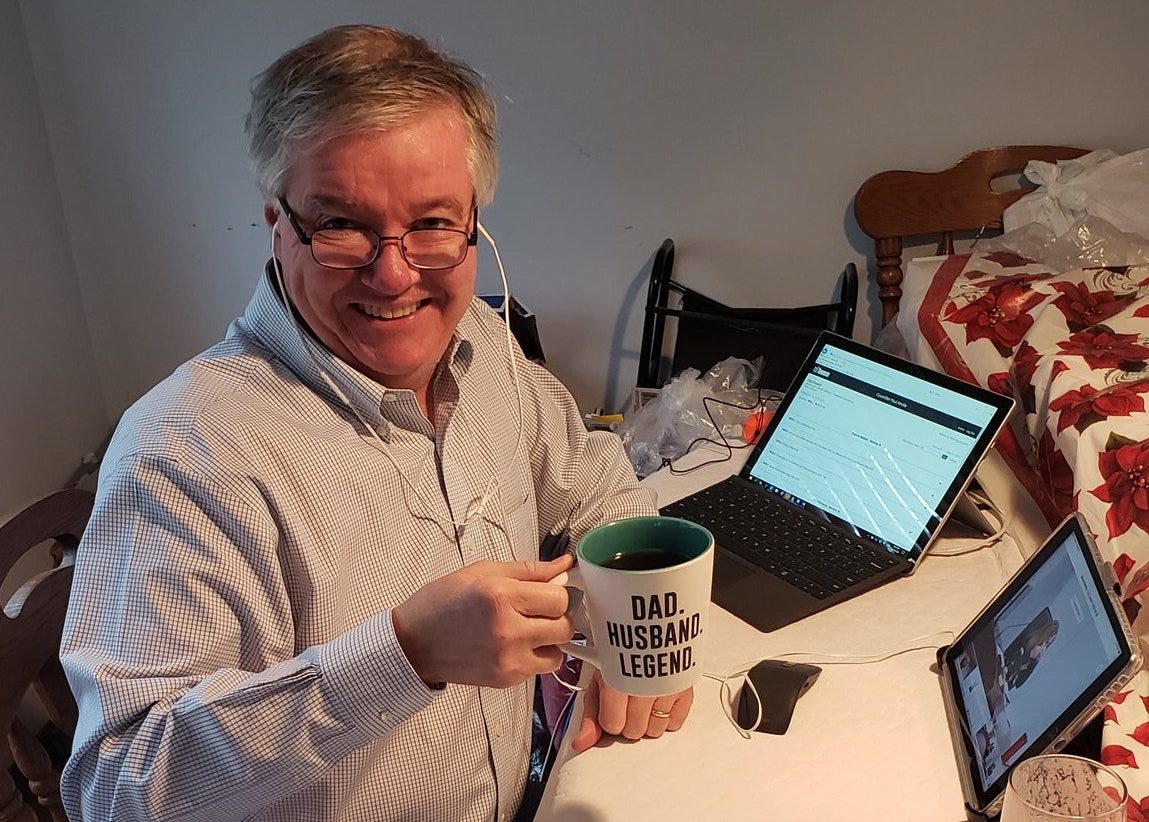
Councillor Paul Ainslie at home during the recent virtual meeting of Toronto Council. (Photo courtesy Paul Ainslie)
I spoke to Councillor Paul Ainslie on Thursday, May 7, just about an hour after news broke about Sidewalk Labs pulling their proposal for Toronto’s waterfront. We talked about that, Open Data, government management and more.
This interview has been edited for length and clarity.
Matt Elliott: To start, how are the people of Scarborough Guildwood (Ward 24) holding up through this?
Paul Ainslie: I think we’re doing okay. When it comes to social distancing, I’ve got a mix in my ward. It’s probably 50% single family residential. So, you know, they can get out and walk and don’t have a lot of concerns about social distancing. And then the other good chunk of my ward is apartment buildings. And their big challenge is just getting up and down out of their building and trying not to put ten people in an elevator. Under social distancing rules, you’re only supposed to have two people in an elevator, but my largest building has close to 28 floors and four elevators. So they try and follow social distancing rules, but it can be a challenge for them — for people living in buildings. I’m sure it’s even worse in condos downtown.
ME: What’s your day to day like these days? It’s very different from it’s ever been as a councillor, I assume.
PA: Yeah, it’s a lot of video conferencing generally. So I’m up by generally 7:30 or 8 a.m. I go through my emails. I read The Globe and the Star every morning. I have an e-blast that I send usually two to three times a day. Most days is twice a day, in the afternoon and evening, but sometimes, depending on what’s going on, it might go three times a day.
And I found that very helpful. It goes so to about 11,000 households in my ward now. So I spend a lot more time writing than I used to before.
And that kind of is my day — just trying to make sure I get the relevant information out there. And I generally find that when the e-blasts go out, that’s when I get e-mails back from my residents who want clarification or better understanding of what’s going on.
And then I guess the other big thing is, you know, a good chunk of businesses in my ward are small mom-and-pop businesses, so I’m trying to get the information out to them about what services or supports are available for them from all three levels of government. And that’s a huge concern for a lot of them, because they don’t own the building they’re in. They’re renting. And I’ve had some tenants say to me, you know, their landlords have been great and cut back on their rent or they didn’t collect rent at all in the month of April. And then other landlords are like, you know, I have costs, I have mortgages to pay, if you’re not going to pay your rent, then I’ll find somebody else to use your space.
ME: Have some businesses in your ward been forced to close permanently at this point?
PA: I haven’t had any yet, fortunately, that I know of or I’ve been aware of. I’ve had business owners say they’re on the verge and they really need something to change. And I think Premier Doug Ford loosening up the restrictions around curbside business will go a long way to helping.
ME: We’ve been talking about video conferencing a little bit. You had a big video conference call last week with the first virtual Council meeting. How did that go, in your view?
PA: It wasn’t bad. You know, I’m pretty techie. So I was able to find a place in the house and get wired up. One of the things that kind of amused me was some of my colleagues were a little more verbose than they are usually in a Council meeting. It kind of reminds me of when I was talking to a friend of mine who’s a teacher — he used the example of one of his kids, who didn’t really like to go to school, but excels over the internet. He gets his assignments all in on time. He’s a different kid over the Internet than he is in the classroom. And I’ve seen a few of my colleagues seem to be a little more verbose over the Internet than they were in standard sit-down council meetings.
And then I guess the only real thing we’ll have to get our head around is vote tabulation and doing a recorded vote for everything. I’m going to reach out to the City Clerk and see what we can do. Even if, instead of recording every positive vote, we just say, "Who’s against this?" and just record the negative votes. And we assume that if you’re not negative, you’re in favour and go from there.
ME: You’re the Chair of the General Government & Licensing Committee - formerly the Government Management Committee. What’s your view on how Toronto’s government has been managing this pandemic? And are there issues you’re collecting during this time that you’re looking to bring back to committee once we get to the recovery and rebuild stage?
PA: Probably the biggest issue that I’m having is around taxis — the taxi drivers and limousine drivers who still pay an annual license fee. That’s why we’re going to be looking at whether we reduce those fees or set up a different structure to help them.
In terms of the general government component, I’ve been doing a lot of work with our city’s chief technology officer, and [Deputy City Manager, Corporate Services] Josie Scioli as well. We’ve got a lot of work around modernization that we’ve been doing: working from home, getting departments to break down silos, and using more technology. So we’ve had a lot of discussions around how we’re going to keep moving the city forward on that. And also making sure we have procedures in place to make sure that, once this pandemic slows down or — knock on wood — ends, these advances we’ve made in making government more efficient don’t go backwards.
ME: Is there an opportunity to use this experience for some streamlining of government?
PA: Yeah. Like, as an example, a friend of mine — his son worked for a developer up in St Clair and had to jump on the subway, take the subway downtown, walk over to Metro Hall and stand in line to submit paperwork. A lot of municipalities do that over the Internet. So there are a lot of things like that — streamlining government and making it more efficient.
We’ve also been doing a lot of work around open office modernization and shared workspaces, trying to figure out if we continue that and how that looks when we start reopening the offices, making sure that it’s all clean and accessible in the new reality.
ME: There’s lots of data floating around about COVID-19 and the response. What’s your take on how the City’s Open Data policies have been working during this crisis?
PA: Not bad. I’ve been happy. We’re continually rolling out data sets and enhancing the sets we have. And there’s a lot of talk around artificial intelligence and how it can be used in the health care system. I think there’s a lot of opportunity there to use technology in forecasting, like with issues around COVID-19 and where it could be more prevalent.
There’s been a lot of talk around using demographics to examine areas of the city that could be at more risk than others and predicting where, you know, COVID-19 could strike again. And I think using that data is important and so is making sure that it gets shared between the planning department, our health officials and our emergency planning staff. That’s why I really push Open Data. We have a lot of information on our hands and it doesn’t always get shared properly. Sharing it makes society a much better place.
ME: Speaking of data, it just broke an hour ago, but do you have any initial thoughts on the news that Sidewalk Toronto is pulling out of their proposal?
PA: You know, on one level, I was disappointed. I think Sidewalk Labs brought a lot to the table in terms of technology and how we used it.
But I guess the other point that I always push with Open Data is it has to be secure. Sidewalk Labs was looking at a technology-driven community where there are cameras everywhere and sensors, collecting a lot of data about people’s private lives and how they use public space. And while Open Data and data can be used to improve how we live, there’s also a big component of confidentiality and security that needs to be looked at. And I know that some people had a lot of concerns — and I did as well — around how that data got looked after.
And, you know, when I raised issues around Sidewalk Labs and security, some of my colleagues were like, well, if Sidewalk Labs leaves, there’s a huge opportunity lost there — like we’re gonna have to go back to the drawing board. And I said to them, as a municipal government we have a responsibility to our citizens to make sure they’re looked after, and their data needs to be protected. And if for some reason we can’t reach an agreement with Sidewalk Labs, there’s lots of companies around the world and I’m sure one of them will come to the table. We have a huge swath of undeveloped land down in the Port Lands, and it’s pretty hard to find any major city in North America that has that much undeveloped waterfront land available. So it’s unfortunate Sidewalk Labs left, but I think there’s still lots of opportunity there for another company to come forward that we can work with.
ME: Last question I have for you. People are stuck at home, maybe getting a little bit bored. Do you have any recommendations for things people could be watching or reading or doing right now?
PA: Well, first and foremost, I’m on the public library board. We’ve loosened up our restrictions around getting a library card. And we have a platform called overdrive. And you can get an e-book out. If you go to the Toronto Public Library website, there’s lots of different courses you can take. You can learn a language. I always say if you have a public library card, the world is at your fingertips. I always enjoyed reading right from a very early age. You can immerse yourself in a book and be sitting on a bench in Scarborough and feel like you’re anywhere in the world or even the universe. So that’s one resource that I always push for.
We’re also very fortunate here in eastern Scarborough to have a lot of parkland and green space. So you can get out and exercise. But you know, I just had a conversation with one of my residents last night about how we’ve talked about opening up the streets in downtown Toronto. And his perspective was we don’t need to be opening up streets — just keep the sidewalks the way they are. And I’m like, well, you know, sir, downtown Toronto is not as fortunate as we are here in Scarborough with all the green space we have and the wide sidewalks and the hiking paths. So I said if we need to have more protected bike lanes or pylons to widen the sidewalks, if it’s to help people get out and about and stay healthy, that’s something that needs to be done. You can’t lose that perspective. It’s a huge city and every area of the city has different needs and concerns.
PREVIOUS COVID-19 CHECK-INS: Councillor Brad Bradford | Councillor Frances Nunziata
More from Matt: on modular housing and Sidewalk Labs
For the Star last week, I wrote about the Council-approved plan to buy and install modular housing for people in the shelter system. I’m a fan. A lot of people emailed in to say they liked the Super Mario 3 reference in this one. Remind me to add “Got a reference to Super Mario 3 in Canada’s largest-circulation newspaper” to my LinkedIn profile.
In the Star this week, I come to terms with Sidewalk Labs’ decision to break up with Toronto. I’ll miss seeing their names pop up in Lobbyist Watch. Other aspects I will not miss.
One of the things I found most striking when reviewing the Sidewalk plan was to compare it the plan for Bayside, literally right next door to Quayside. That plan, which has moved from planning to construction with almost zero controversy, actually involves slightly more land — 13 acres, versus 12 for the Sidewalk lands.
It underscores one of the major issues with the Sidewalk strategy. It sucked all the oxygen out of the room, distracting from all other waterfront progress. And there’s a lot of progress! But instead of talking about the fundamentals of waterfront development — housing, transit and greenspace — we spent two-and-a-half years mired in an ultimately pretty fruitless debate about digital governance and data privacy. Important topics, sure, but it’s time to get back to basics.
Look for my column in the newspaper this week. No references to NES games this time out, sadly.
In other news

Metrolinx
A blog post by Metrolinx features the first images and video of an Eglinton Crosstown vehicle in the freshly-built tunnel. Actually riding this thing for the first time is going to be so cool.
The Star’s Donavan Vincent and David Rider talk to a variety of experts about the fallout from the Sidewalk Labs break-up, with a lot of focus on using the St. Lawrence neighbourhood as a model for future neighbourhood development.
“We need to use a public health lens to tackle our housing crisis and end chronic homelessness. If policy makers can finally listen to the recommendations of our public health experts, we can address food security, provide affordable childcare, and fight the overdose crisis through safe supply.” At Spacing, Councillor Joe Cressy makes the case for changes in the post-pandemic times.
Fixer Jack Lakey tells us the story of IT project manager at City Hall Stephen Lew, who a few weeks back agreed to be redeployed as a cleaner in one of the city’s long-term care homes.
The week at Toronto City Hall
MONDAY: No meetings scheduled.
TUESDAY: No meetings scheduled.
WEDNESDAY: 🎶 The Toronto Music Advisory Committee has a special virtual meeting to hear about COVID-19’s impacts on the music community, and look at some strategies for helping out live music venues.
💰 The Debenture Committee meets to issue $200 million worth of debt, to fund a variety of programs and services. Here’s the breakdown:
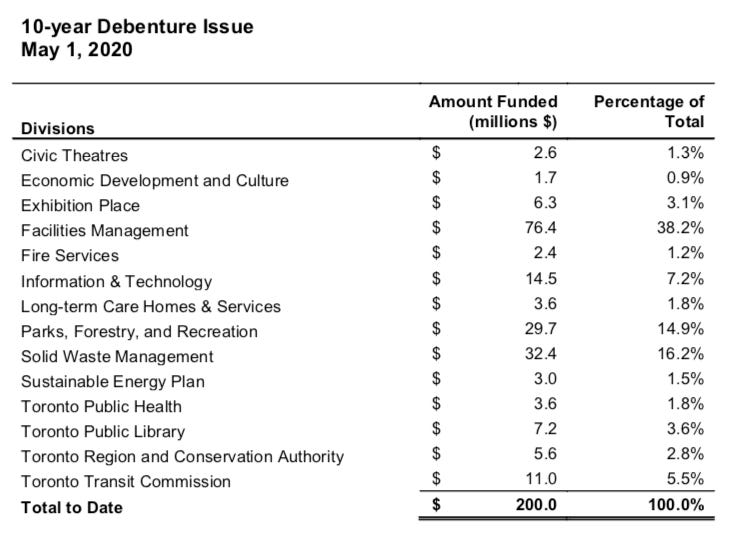
🏆 Bid Award Panel contract award of the week: $672,340 for streetscape improvements in Emery Village.
🚈 The TTC Board meets for their first-ever virtual meeting. It’s a pretty busy agenda.
There will be a presentation on the TTC’s response to COVID-19 and a report on financial impacts. Neither were available at newsletter press time.
CEO Rick Leary’s monthly report gives some detail on the COVID-19 damage, with charts illustrating the disastrous drop in ridership and revenue.

There’s also this chart of Presto Taps, showing a dramatic decline followed by a period of stability.
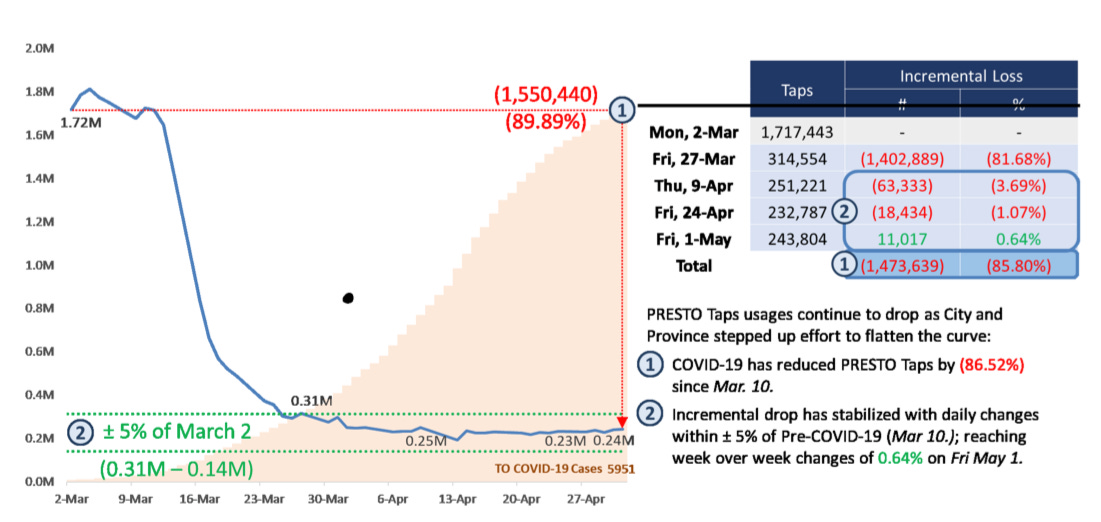
The CEO’s report also provides data on employee absence rates related to COVID, showing lower number than you might expect.
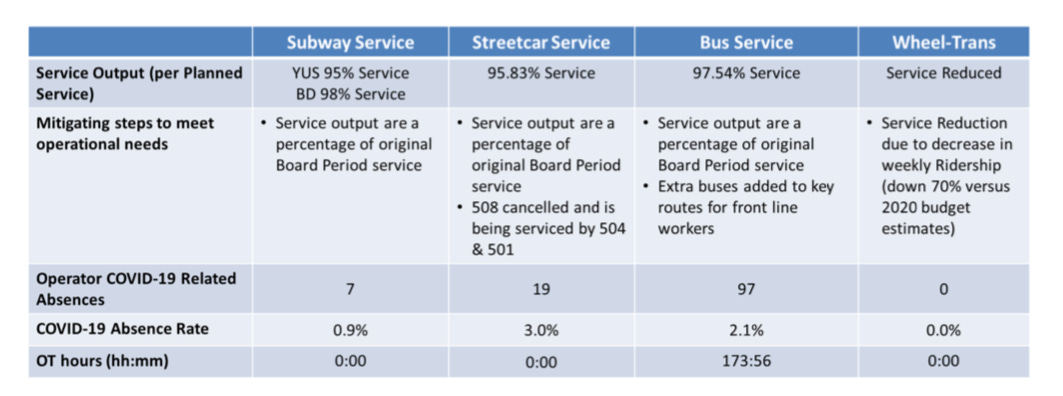
The pandemic seems to have greatly improved vehicle reliability in some cases. Not having as many riders means a lot less wear-and-tear. Look at the suddenly improved distance-between-failures on both the Bloor-Danforth subway fleet and the new streetcars.
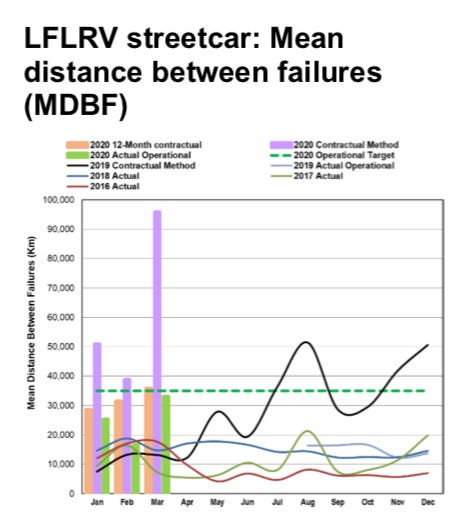

In non-COVID news, the Board will also review a report on complaints about special constables and fare inspectors, with some annual stats.

There’s also a report breaking down arrests on the TTC in 2019.

Rounding things out, there are reports on the 2019 operating budget and capital spending and a new wayfinding strategy that floats the idea of creating VR models of subway stations so people can do walkthroughs at home.

THURSDAY: No meetings scheduled.
FRIDAY: 🚘 There’s a Toronto Parking Authority meeting on the schedule, with no agenda posted yet.
City Hall Watcher #70
Thanks for reading! Remember, you can subscribe and get this kind of content in your inbox EVERY week for just five bucks a month or $50 a year.
Next week is a holiday Monday, so issue #71 will hit inboxes on Tuesday, May 19. See you then and there.



